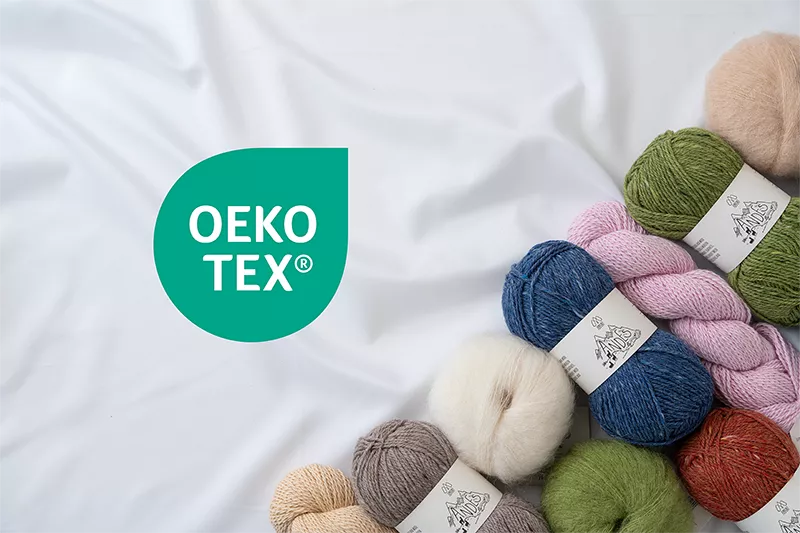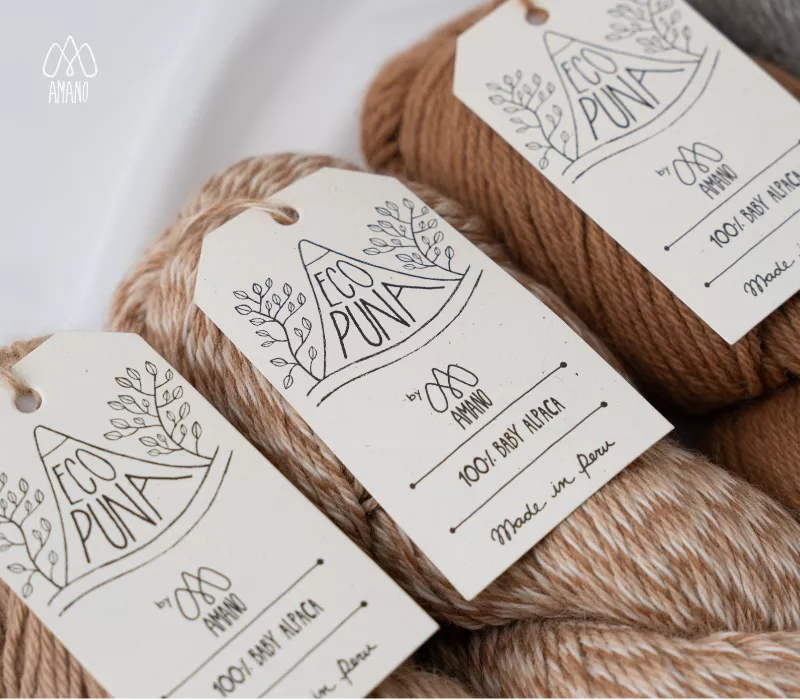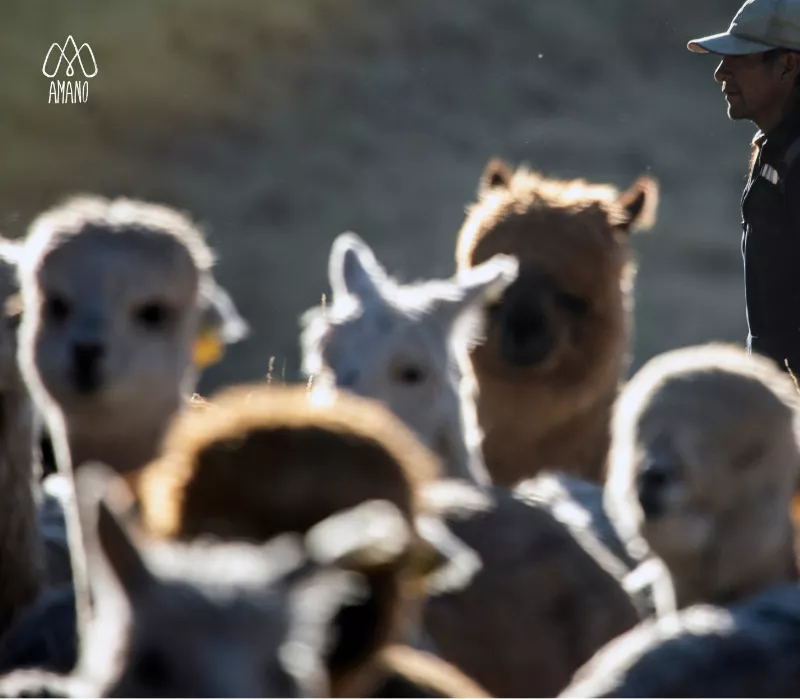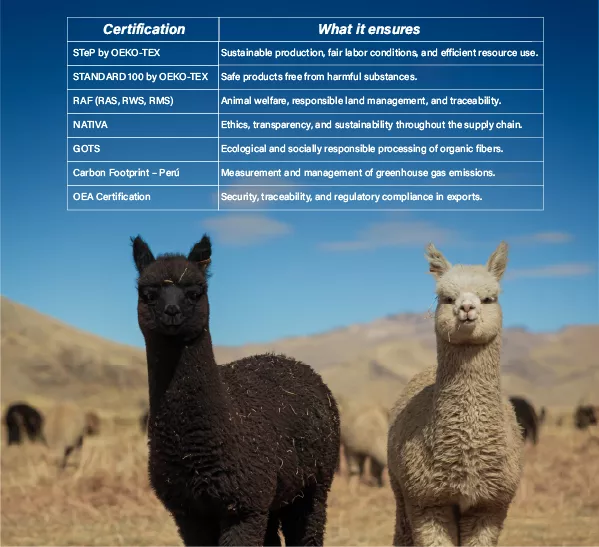Buying sustainable textiles is not just about choosing natural fibers. It’s about understanding the full impact of every strand, from the origin of the raw material to the spinning, dyeing, and distribution process. It’s about knowing whether that fiber respects the environment, whether it was produced without harming ecosystems, and whether the people involved in its creation were treated fairly.

At Amano Yarns, we work with fibers like baby alpaca, merino wool, and royal alpaca, offering skeins and balls for brands, designers, and end consumers who seek more than aesthetics. They seek traceability, commitment, and certified quality.
What fibers does Amano Yarns offer for truly sustainable fashion?
Amano Yarns works with natural fibers that combine low environmental impact, high technical value, and certified traceability. Most of our fibers are certified under OEKO-TEX Standard 100, which guarantees they are free from harmful substances to human health and safe for direct skin contact. This certification applies to various lines in our portfolio, reaffirming our commitment to chemical safety and transparency. Among our most representative certifications are:
- OEKO-TEX Standard 100, ensures that the fibers are free from harmful substances to human health. They are safe for direct skin contact and comply with international standards for chemical safety.
- RAS (Responsible Alpaca Standard), validates animal welfare, responsible land management, and the traceability of alpaca fiber. Puna and Puna Light are two qualities that carry this certification.
- GOTS (Global Organic Textile Standard), guarantees that the fiber has been produced under organic and social criteria throughout the entire supply chain. Sami and Sami XL are strong examples of this certification.

These certifications are not decorative. They are concrete proof that each product has undergone audits, controls, and processes that guarantee real sustainability.
Why do certifications matter?
Talking about sustainability is easy. Proving it is the real challenge. That’s why at Amano Yarns we rely on internationally recognized certifications that validate each of our commitments with technical rigor. It’s not about marketing labels, it’s about verifiable guarantees that support our practices from origin to final product.
The OEKO-TEX Standard 100 certification, present in most of our fibers, ensures that products are free from harmful chemicals and safe for direct skin contact. This is especially relevant in processes like dyeing and finishing, where chemical safety is critical.
Meanwhile, the RAS (Responsible Alpaca Standard) certification guarantees that alpaca fiber comes from animals raised under responsible welfare standards, with full traceability and sustainable management of high-Andean ecosystems. It’s a seal that connects ethics with excellence.
Finally, GOTS (Global Organic Textile Standard) is one of the most demanding certifications in the industry. It evaluates the entire supply chain, from organic fiber cultivation to spinning, dyeing, and labeling, ensuring fair labor conditions and clean processes.
These certifications not only allow us to operate transparently, but also give brands and designers the confidence to work with materials that meet the highest international standards.
How does sustainable textile connect to design and production?
From the first sketch to the final garment, sustainability becomes a guiding thread through every stage: material selection, environmental impact, animal welfare, traceability, and user safety.
For brands and designers, this means building collections that not only look good but make sense. Collections that can clearly answer increasingly common questions: Where does this fiber come from? How was it produced? What impact does it have? Who is behind it?

At Amano Yarns, all our qualities are backed by international certifications like OEKO-TEX Standard 100, RAS, and GOTS, validating clean, ethical, and traceable processes. If you’re looking for natural fibers that align with your vision of conscious fashion, we invite you to explore our full catalog where every yarn tells a story of origin, commitment, and beauty.
What should you consider when buying sustainable yarn?
- Fiber origin: Do you know where it comes from? Who produces it?
- Production process: Is it traceable? Are environmental standards respected?
- Certifications: Can you prove your fiber is truly sustainable?
- Social impact: Does it support local communities? Does it generate fair employment?
- Technical quality: Does the fiber meet your design requirements?
At Amano Yarns, every product answers these questions. We don’t sell promises—we offer fibers with technical backing, traceability, and natural beauty.

Certifications
Conclusion
Sustainable textiles are not a trend. They are a responsibility. And every brand, designer, or consumer who chooses to work with certified fibers is contributing to a fairer, cleaner, and more transparent industry.
At Amano Yarns, we offer natural fibers backed by genuine certifications: OEKO-TEX, RAS, and GOTS. Products such as APU, AWA, ECO PUNA, PUNA, PUNA LIGHT, SAMI, and SAMI XL, along with other qualities in our portfolio, are proof that beauty, technical excellence, and ethics can go hand in hand.
If you’re looking to bring real sustainability into your projects, Amano Yarns is your ally. Because every skein can be the beginning of a better-told story.



